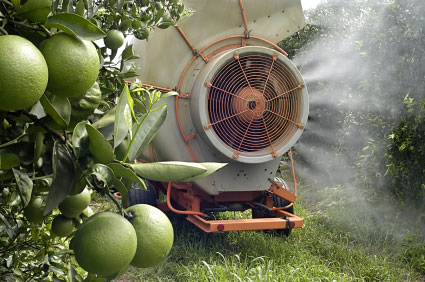
Writing in The Omnivore’s Dilemma, Michael Pollan detailed how, following World War II, nerve-gas factories were converted en masse into synthetic pesticide factories. These weapons reborn as pesticides are organophosphates, as are both Sarin and VX gases. For farmers, they work by, as Wikipedia tastefully puts it, “irreversibly inactivating” an essential neurotransmitter within insects — just as they worked for military generals by irreversibly inactivating the same equally essential neurotransmitter within soldiers.
The dangers of organophosphates are thus nothing new, though industrial agriculture continues to drop tens of millions of pounds of them on fields across the country every year. The argument in favor of their use has always been that, whatever their devastating effects at high doses, general exposure through the environment was far too low to do any harm.
The BPA fiasco has, of course, taught us that low-level exposure to supposedly “nontoxic” doses can indeed be a problem. And now researchers from Harvard and the University of Montreal report in the Journal of Pediatrics that low-level exposure to organophosphates may significantly increase the risk of ADHDin children. “The findings are based on data from the general U.S. population, meaning that exposure to the pesticides could be harmful even at levels commonly found in children’s environment,” says Reuters.
The sample included 1,139 children 8 to 15 years old, of which about one in ten met the criteria for ADHD, matching estimates for the general population. Researchers then measured the level of organophosphate “metabolites,” i.e. the chemicals that these pesticides break down into within the body, in these children’s urine. What they found was that as exposure increased, ADHD risk increased; a tenfold increase in exposure was associated with a 50% increase in risk of ADHD, which is considered very large. Again, the children in this study are not the children of farmworkers or residents of agricultural areas — they are “representative of the general US population.”
The Reuters article included an appropriately lame response from pesticide maker Dow:
Garry Hamlin of Dow AgroSciences, which manufactures an organophosphate known as chlorpyrifos, said he had not had time to read the report closely. But, he added, “the results reported in the paper don’t establish any association specific to our product chlorpyrifos.”
Researchers were, as I said, only looking at the metabolites of these pesticides. I’m not chemist enough to know if Hamlin is touting the fact that chlorpyrifos‘ metabolites weren’t found or if he’s trying pull a logical fast one by touting the fact that chlorpyrifos itself wasn’t found. Either way, to argue that a study implicating an entire class of chemical, of which your product is a member, somehow doesn’t apply to you is the height of shamelessness.
To summarize:
1) Some of the most common pesticides on the planet may very well cause ADHD in children whose only exposure comes from their use on food and in household products (although further study is needed to establish a causal link)
2) Some exposure to these chemicals can be avoided by buying organically grown fruits and vegetables
3) If you must buy conventionally grown fruit and vegetables, wash them well. A cheap and easy way to make your own vegetable wash involves filling a spray bottle with water and adding a dollop of 100% natural dish soap along with a tablespoon of distilled white vinegar.
[May 25 UPDATE]
The EPA has released a statement responding to the reported link between organophosphate pesticides and attention-deficit hyperactivity disorder (ADHD) and confirms the significance of the conclusions: “The Agency is taking this study very seriously and is incorporating its findings in EPA’s ongoing evaluation of the organophosphate pesticides, along with additional health data.”
The statement also claims that during the study period, organophosphate use dropped by 57% in food and was virtually eliminated in household products, suggesting that exposure risks may have decreased somewhat since the data was gathered.
The EPA encourages consumers to try non-chemical pest control methods first and to wash fresh produce. Notably and unlike the original study, it does not mention the most obvious means to avoid organophosphate (and other pesticide) exposure: choosing organically grown foods.



